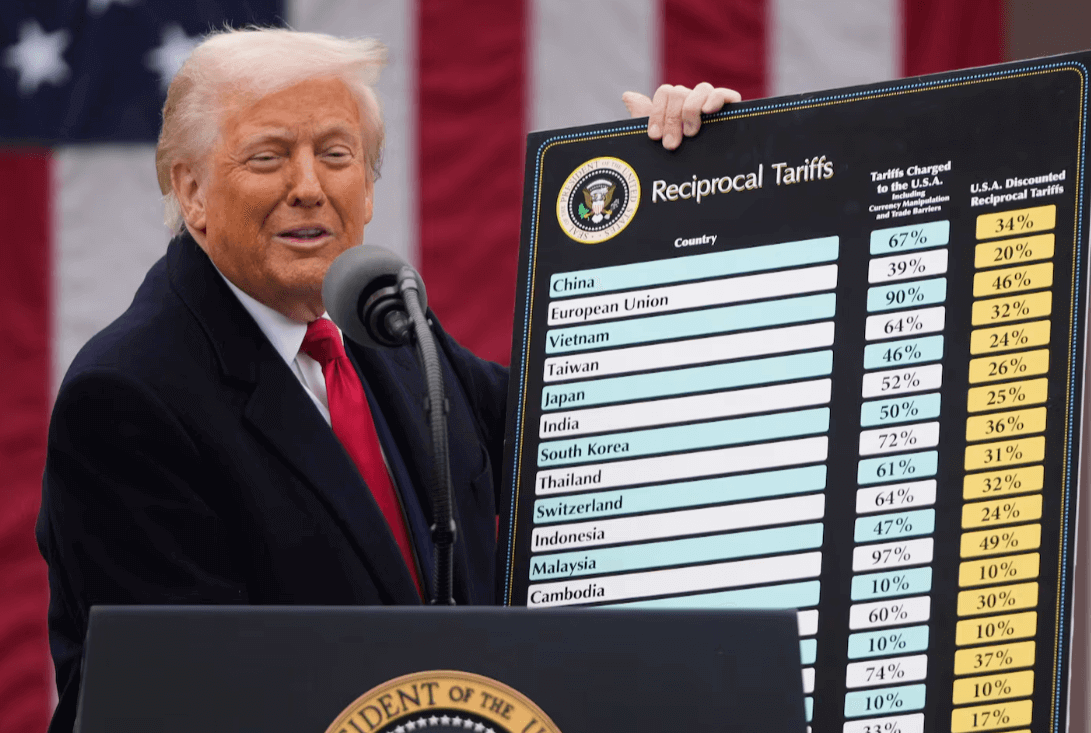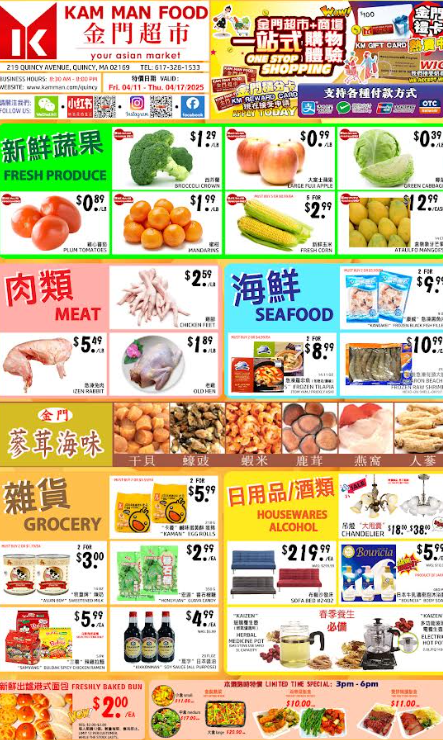关税再次扰乱市场,特朗普态度强硬

【中美创新时报2025 年 4 月 5 日编译讯】(记者温友平编译)特朗普总统宣布扩大全球关税两天后,美国面临广泛而痛苦的反击,中国对美国商品采取报复性措施,由于担心持续的、破坏性的贸易战,市场再次暴跌。《纽约时报》记者托尼·罗姆对此作了下述报道。
特朗普将于周六开始对进口产品征收几乎全面的关税,这标志着特朗普极力捍卫的一场可能代价高昂的贸易冲突的第一枪,全球经济似乎没有哪个领域能幸免于难。
特朗普已对中国征收了 20% 的关税,中国也宣布了反击计划。北京承诺下周对美国商品征收 34% 的关税,包括农产品。中国调整了关税,以配合特朗普对中国进口产品征收 34% 关税的决定。
双方针锋相对给金融市场带来了巨大打击,因为华尔街意识到全球贸易僵局升级的可能性越来越大。截至收盘,标准普尔 500 指数下跌近 6%,使其更接近熊市,这是华尔街常用的一个术语,指的是从峰值下跌至少 20%。科技股占比较高的纳斯达克指数下跌 5.8%,将其推入熊市区域。
尽管一些数据显示劳动力市场存在潜在疲软,且特朗普政府经济政策的影响才刚刚开始显现,但美国雇主在 3 月份仍加速招聘。
尽管周五上午政府报告称美国就业市场依然强劲,但股市还是出现了大幅抛售。美国劳工部报告称,3 月份雇主增加了 228,000 个就业岗位,远超预期。失业率从 4.1% 升至 4.2%。
该数据令人意外,因为许多分析师预测今年经济增长将放缓。
与此同时,随着中国将矛头指向美国,世界贸易组织总干事恩戈齐·奥孔乔-伊韦阿拉周五警告称,不要出现“导致贸易进一步下滑的报复措施周期”。在美国,美联储主席杰罗姆·鲍威尔也对难以预测的经济走势发表了自己的悲观言论。
鲍威尔表示:“尽管不确定性仍然很高,但现在越来越明显的是,关税上调幅度将远远超出预期。经济影响可能也是如此,包括通胀上升和经济增长放缓。”
鲍威尔称,这种结果的风险“很高”,他警告称,这种结果可能导致失业率上升。
但特朗普对当天的混乱局面的反应是挑衅。他从华盛顿迁往佛罗里达州的家乡海湖庄园,并在“真相社交”上宣称:“我的政策永远不会改变。”
相反,总统在另一篇帖子中坚称他的策略“已经发挥作用”,同时他手拿一份新发布的、好于预期的就业报告,该报告反映出在他宣布征收关税之前的一个月,美国的招聘人数有所增加。
有一次,总统甚至传播了另一个用户的视频,该视频称“特朗普故意让市场崩溃”,以迫使美联储降低利率。他后来呼吁鲍威尔这样做,要求央行独立主席“停止玩弄政治”。
特朗普最终将注意力转向中国,指责中国报复美国是“错误做法”。特朗普及其助手此前曾暗示,如果其他国家试图对美国商品实施报复,他们可能会提高关税税率。
全球争夺战在许多方面凸显了特朗普关税的分量以及他重新调整全球贸易体系的宏伟抱负的重要性。白宫认为这些关税对于重塑美国贸易关系至关重要,而特朗普认为这种贸易关系不公平,同时可以促进美国制造业并增加新收入。
但这些关税(即进口税)可能会对企业造成沉重打击,因为企业生产产品的成本可能会增加。这反过来又会打击消费者,因为消费者很可能会承担任何价格上涨的负担。经济学家普遍认为,结果可能是通胀率上升,消费者支出和企业投资放缓,这两者共同抑制了美国经济增长,并将经济推入衰退。
咨询公司 RSM 总裁兼首席经济学家乔·布鲁苏拉斯 (Joe Brusuelas) 表示:“市场对新关税制度表现出不信任。”他还表示,特朗普周五的言论只会“加剧人们对没有战略路线图的恐慌和担忧”。
但最近几天,特朗普和他的高级助手们驳斥了这些悲观的预测。他们通过有线电视新闻网,驳斥了市场的涨跌,并承认关税可能会造成短期经济痛苦,总统将其比作“生病”的病人接受痛苦但必要的手术。
美国政府及其保守派盟友也努力转移来自经济学家的批评,一再将他们描绘成过去错误判断总统议程的反对者。
保守派经济智库美国指南针 (American Compass) 首席经济学家奥伦·卡斯 (Oren Cass) 周五表示:“我认为很明显,经济界的言论几乎完全是意识形态的,与实际的风险回报计算不成比例。”
全球领导人、美国政界人士和其他人士否认了这种观点,他们表示,在全球大部分地区经历两年的快速通胀后终于恢复平衡之际,特朗普的做法可能会削弱全球经济,并导致物价飙升。
世贸组织总干事奥孔乔-伊韦阿拉周五在一份声明中警告称,特朗普的政策“可能导致今年全球商品贸易量整体萎缩约1%,比之前的预测下调了近4个百分点”。
加利福尼亚州表示将尝试谈判自己的贸易协议,而民主党州长加文·纽瑟姆则希望保护当地的农业和其他企业。纽瑟姆在一份声明中表示,总统的策略将“对现实中的人们产生非常深刻的影响,包括那些投票给唐纳德·特朗普、现在被这届政府背叛的人。”
甚至视频游戏也未能逃脱这场纷争:日本任天堂宣布将推迟备受期待的即将推出的游戏机 Switch 2 的预售,理由是需要“评估关税和不断变化的市场条件的潜在影响”。特朗普表示,日本对美国的出口将面临 24% 的关税。
一些外国政府也在最后一刻忙着研究如何或是否进行报复,同时试图说服华盛顿放宽即将实施的进口税。
欧盟贸易专员马罗斯·塞夫乔维奇周五表示,他与特朗普的贸易使者进行了“坦诚”的交流,并在社交媒体平台X上发帖称:“我很清楚:美国的关税是有害的,没有道理的。”
周五早些时候,特朗普表示,他已与越南共产党总书记苏林通了电话,越南将从下周开始对其对美出口产品征收 46% 的关税。特朗普表示,越南“如果能与美国达成协议,希望将关税降至零”,但总统并未明确表示是否会接受这样的协议。
特朗普政府对于达成协议的意愿发出了矛盾的信号:特朗普的一些顾问表示,他们无意讨价还价,但总统本人本周早些时候告诉记者,如果美国能以放宽关税的方式获得“非凡的”回报,他愿意进行谈判。
题图:特朗普总统周三在白宫玫瑰园宣布了新的关税。Mark Schiefelbein/美联社
附原英文报道:
Trump sounds defiant note as tariffs roil markets again
By Tony Romm New York Times,Updated April 5, 2025
Two days after President Trump announced his expansive global tariffs, the United States confronted wide-ranging and painful blowback, as China retaliated against US goods and markets plummeted again on worries of a persistent, damaging trade war.
No portion of the global economy appeared unscathed as the world braced for Trump to begin imposing his nearly across-the-board taxes on imports Saturday, marking the first salvo in a potentially costly trade conflict that the president has vigorously defended.
China, which Trump has already hit with 20 percent tariffs, announced plans to retaliate. Beijing promised to impose a 34 percent tariff on US goods next week, including on agricultural products. China calibrated its tariffs to match Trump’s decision to add a 34 percent tax to Chinese imports.
The tit-for-tat delivered a huge blow to financial markets, as Wall Street reckoned with the rising odds of an escalating global trade standoff. By the closing bell, the S&P 500 had fallen by almost 6 percent, pulling it closer into a bear market, a widely used Wall Street term for a decline of at least 20 percent from its peak. The tech-heavy Nasdaq fell 5.8 percent, pushing it into bear market territory.
US employers accelerated hiring in March, even as some data suggest underlying weaknesses in the labor market, and with the impact of the Trump administration’s economic policies only starting to play out.
The brutal selloff came despite a government report Friday morning that the US job market remains robust. The Labor Department reported employers added 228,000 jobs in March, far more than expected. The unemployment rate rose to 4.2 percent, from 4.1 percent.
The data came as a surprise, as many analysts predicted a cooling in economic growth this year.
Meanwhile, as China took aim at the United States, Ngozi Okonjo-Iweala, the director general of the World Trade Organization, warned Friday against a “cycle of retaliatory measures that lead to further declines in trade.” In the United States, Jerome Powell, the chair of the Federal Reserve, struck his own downbeat note over the unpredictable trajectory of the economy.
“While uncertainty remains elevated, it is now becoming clear that the tariff increases will be significantly larger than expected,” Powell said. “The same is likely to be true of the economic effects, which will include higher inflation and slower growth.”
Powell characterized the risks of that outcome, which he warned could include higher unemployment, as “elevated.”
But Trump responded to the day of chaos by striking a defiant tone. Having decamped from Washington to Mar-a-Lago, his home in Florida, he declared on Truth Social: “MY POLICIES WILL NEVER CHANGE.”
Instead, the president insisted his strategy was “ALREADY WORKING,” he said in another post, as he held up a newly released and better-than-expected jobs report, which reflected US hiring increased in the month before the announcement of his tariffs.
At one point, the president even circulated another user’s video that argued “Trump is purposely CRASHING the market,” in a bid to force the Fed to lower interest rates. He later called on Powell to do just that, demanding the independent chair of the central bank “STOP PLAYING POLITICS.”
And Trump eventually turned his attention to China, attacking the country for having “PLAYED IT WRONG” by retaliating against the United States. The president and his aides previously have signaled they could ratchet up their tariff rates if other nations look to exact retribution on US goods.
The global scramble in many ways underscored the weight of Trump’s tariffs and the significance of his grand aspirations to recalibrate the global trading system. The White House sees these levies as critical toward resetting US trade relationships, which the president contends are unfair, while boosting US manufacturing and raising new revenue.
But the tariffs, which are taxes on imports, threaten to fall hard on businesses that could face new costs to produce their goods. That, in turn, could hammer consumers, who are likely to shoulder the burden of any price increases. Economists widely believe the result could be a rising rate of inflation, and a slowdown in consumer spending and business investment, which together crimp US growth and push the economy into a recession.
“Markets are expressing a vote of no confidence in the new tariff regime,” said Joe Brusuelas, principal and chief economist at the consulting firm RSM. He added that Trump’s commentary Friday only “adds to the consternation and concern that there’s no strategic road map.”
But Trump and his top aides have swatted away those dour projections in recent days. Fanning cable news, they have dismissed the ebb and flow of the markets and acknowledged the possibility that tariffs could create short-term economic pain, which the president has likened to a “sick” patient receiving a painful yet necessary medical operation.
The administration and its conservative allies have also labored to deflect criticism from economists, repeatedly portraying them as naysayers who had wrongly judged the president’s agenda in the past.
“I think it’s very clear the rhetoric of the economic community, in particular, is almost entirely ideological and out of proportion to the actual sort of risk-reward calculation,” Oren Cass, chief economist at American Compass, a conservative economic think tank, said Friday.
Global leaders, US politicians and others rejected that view, saying that Trump’s approach threatened to weaken the global economy and send prices soaring just as much of the world was finally returning to a sense of balance after two years of rapid inflation.
Okonjo-Iweala, the WTO director general, warned in a statement Friday that Trump’s policies “could lead to an overall contraction of around 1% in global merchandise trade volumes this year, representing a downward revision of nearly four percentage points from previous projections.”
The state of California signaled it would try to negotiate its own trade deals, as Governor Gavin Newsom, a Democrat, looked to protect local agriculture and other businesses. In a statement, Newsom said the president’s tactics would be felt in “pretty profound ways to real people, including those who voted for Donald Trump and are now being betrayed by this very administration.”
Even video games could not escape the fray: Japan’s Nintendo announced it would delay presales of its widely anticipated upcoming console, the Switch 2, as it cited a need “to assess the potential impact of tariffs and evolving market conditions.” Trump has said Japan will face a 24 percent tariff on its exports to the United States.
Some foreign governments also mounted a last-minute scramble to figure out how, or if, to retaliate, while trying to persuade Washington to relax its coming taxes on imports.
Maros Sefcovic, trade commissioner for the European Union, said Friday he had a “frank” exchange with Trump’s trade emissaries, posting on the social media platform X: “I was clear: US tariffs are damaging, unjustified.”
Earlier Friday, Trump said he had spoken by phone with To Lam, the general secretary of the Communist Party of Vietnam, which stands to see a 46 percent tariff on its exports to the United States beginning next week. By Trump’s telling, Vietnam “wants to cut their Tariffs down to ZERO if they are able to make an agreement with the U.S.,” though the president did not explicitly say if he would accept such a deal.
The Trump administration has sent mixed signals over its willingness to cut a deal: Some of Trump’s advisers have said they do not intend to haggle, but the president himself told reporters earlier in the week that he could be open to negotiation if the United States received something “phenomenal” in return for relaxing tariffs.

